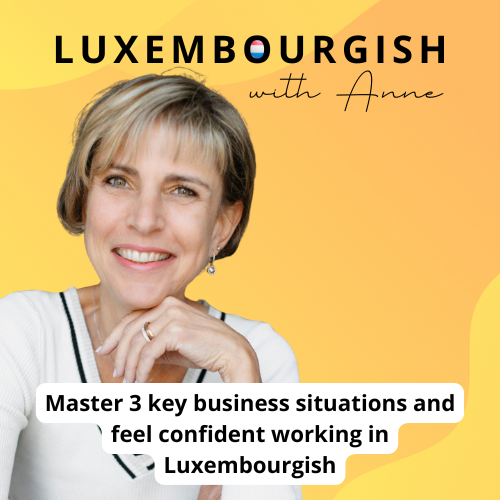“I’m learning Luxembourgish not only to pass the exam to acquire Luxembourgish citizenship but mainly to be able to communicate with native speakers,” Katy said, frustrated. A Russian woman living in Luxembourg, Katy told me over and over how she felt it was difficult to improve her Luxembourgish and stay motivated. “I feel like I express myself like a five-year-old,” she added. “I have no clue how to fix this!” Fortunately for Katy, she had come to the right person.
Who am I, you ask? My name is Anne Beffort, and I am a neuro language coach.
8 Ways a Language Coach Might Be Able to Help You
A language coach is an expert who works with people one-on-one (or in small groups) to help them solve their “language problems.”
Over the past ten years, I’ve helped many students face their fears and conquer the obstacles in their path, at every stage of the learning process. I’ve helped even the most fearful beginners become confident, advanced Luxembourgish speakers.
I love what I do because I know it makes a difference. Not just in the lives of my students, but in the lives of all the people they will share their language skills with, too. Today, I want to give you a preview of some of the massive changes having a language coach can make in your life and your learning.
With a language coach, you will:
- Improve Your Mindset
- Learn How to Learn
- Make Language Learning Part of Your Lifestyle
- Focus on what matters most
- Tackle Language From 4 Different Angles
- Build Sustainable Motivation
- Beat Procrastination
- Track Your Progress
1 Improve Your Mindset
When people come to me for language coaching, they often assume that I have some top secret method or resource that will automatically make them into great language learners.
This is not true.
I do share my most effective techniques and learning strategies with my students. But that’s not what makes the biggest difference in their success. The biggest benefit that I (and any language coach) can offer is something that money cannot buy, and that you cannot outgrow once you have it: the right mindset for language learning.
You see, most language learners have a variety of preconceived notions and false beliefs about:
- What they can truly accomplish
- Which traits will make them better/worse language learners (age, country of origin, ethnicity, “intelligence,” “talent,” schedule, etc.)
The worst thing about these beliefs is that they are usually not founded in reality. These are just things that learners have been told, or that they think might be true.
Language coaches know these “language myths” are not true, because they have personally dispelled them. They have no doubts about what is and is not possible because they have achieved what is possible. When you work with a language coach, they will train you to promote the beliefs that help you learn and ignore the ones that stand in your way.
2 Learn How to Learn
Once you believe you can learn a language, your language coach will teach you how to do it.
Again, the “how” of language learning is not about which language course or method you should use. The truth is that there is no single best method, and good language coaches know this.
Instead of methods, all successful language learners share the same cognitive principles that guide how they go about their learning. These key principles are universal; they can be woven into any learning routine, no matter your personal learning style.
For example, we just discussed mindset. Mindset is a part of an essential learning principle that I call “attitude.” Your attitudes are a combination of how you think about and react to different situations.
Cultivating an attitude of openness to challenge and new experiences will make your language learning journey easier. Maintaining a closed mind and an aversion to challenge will ultimately lead to failure.
This is just one of several principles that I teach to all of my students, regardless of their goals, personal background, or previous language experience. Since these principles are rooted in the science of effective learning, they act as the foundation upon which you build all of your future language learning success.
3 Make Language Learning Part of Your Lifestyle
Over the years, I’ve been approached by many people with questions about “how to find time to learn Luxembourgish .”
These people tell me they want to learn the language, but can’t because they’re simply too busy. They don’t “have the time.
The truth is that time is not something you have, it’s something you create. Of course, we all have the same 24-hour day to work with. But it is how we manage this time that makes the most difference.
Every single one of us organizes our day around our priorities. We set aside time to sleep, to work, to spend with our families, and to relax. These things are a normal part of our lifestyle, so we “create” time for them automatically. When you work with me as your language coach, you’ll know that in order to be successful, you need to make language learning a priority and work your learning time into your daily lifestyle.
And if you think that prioritizing language learning will force you to sacrifice things like hobbies or free time, there’s no need to worry. Your language coach knows that a key part of time management is reclaiming “unused time,” so it’s very possible that you may end up with more free time than you started with!
In all my online courses you are prompted to set up your weekly study plan and to submit it to us.
4 Focus on What Matters Most
Have you ever been a victim of “the beginner binge”?
That’s what I call the period right after you start a language for the first time, and you purchase every single learning resource you can get your hands on. You amass hundreds of resources, all before you seriously start learning. It seems like a good approach at first, since more materials lead to better learning, right?
Wrong. If you begin with too many choices, you are less likely to make any choice at all. The abundance of options will overwhelm and distract you, and you may give up learning because of it.
The goal of any good language coach, of course, is to structure things so that you won’t want to give up. So, in this case, he or she will encourage you to focus deeply on one resource, instead of many possible resources.
In addition to cutting down on potential overwhelm, focusing on a single resource will train you to learn everything you can from it before moving on. With less distractions, you will gain a deeper understanding of the pros and cons of a particular approach. And you’ll be able to use that understanding to guide future learning.
5 Tackle Language From 4 Different Angles
When students hire a language coach, they usually want help solving one major problem: speaking!
These learners are usually incredibly passionate and work very hard on things like grammar, reading, and vocabulary acquisition. Often, they have been learning this way for years.
Despite all of their effort and experience, they never felt ready to use their skills to speak to another person. Because of this, they struggle with basic conversation, as well as other productive tasks like writing.
Learners who avoid certain skills will have an unbalanced overall result. Even if you’re working hard, imbalances can lead to unforeseen issues, and cause unexpected strains.
As a language coach, I don’t want my students to strain themselves unnecessarily. Even if initial progress is slower, I encourage my clients to actively train all four skills (speaking, listening, writing, and reading) so that they all develop at an even pace.
When I’ve worked with students in this way, I’ve seen how a balanced routine can greatly accelerate their progress. When each major language skill is being actively improved, each skill reinforces the other three and you become a much more capable and confident learner as a result.
6 Build Sustainable Motivation
One of the biggest issues with language self-study is that it can often be incredibly lonely, at least at first.
At the beginning of the process, your head is usually stuck in a book or an online course, and the days of connecting with real people can seem far away. You’re doing this on your own, and that can feel very demotivating.
If you’ve felt this way, hiring a language coach can be a great solution to this problem. With a language coach, you’ll never run the risk of feeling unsupported. Or like you can’t get help overcoming the problems in your path.
A good language coach will do everything in their power to lead you to success. Helping you find the motivation you need is a huge part of that.
Even in cases where students need more motivation than I can offer, I actively train my students to continually seek out their own motivation. In this way, I ensure that all the learners I work with have enough inspiration and stimulation to reach their goals.
7 Beat Procrastination
If language learners can be said to have a common enemy, it would be procrastination.
Procrastination is when you decide to avoid hard work and put it off until later (which sometimes turns into never). For language learners, this often happens right before we start a new language. Or when we are about to do something that is difficult or scary.
When you’re working alone, procrastination can be very difficult to overcome. Even if you know you should work on what you’re avoiding, you can always postpone it again, and no one will stop you.
That is unless you have a language coach!
Language coaches are the antidote to procrastination, for a number of reasons.
- First and foremost, your language coach always knows what your goals are. As a result, they will always be able to tell when you’re slacking off.
- Secondly, your language coach should be very knowledgeable about your likes, dislikes, and personal learning style. As such, you will never be given tasks that you find boring, like pointless homework.
- Thirdly, your language coach should have the expertise to know exactly which learning activities will help you improve your skills. Because of this, the tasks you are given should feel like highly-targeted, highly motivated learning challenges.
When you combine all three factors, there’s little chance you’ll even want to procrastinate; you’ll be so excited to make progress that all you’ll want to do is keep on learning.
8 Track Your Progress
Language learning is like a journey, on foot, to a far-away land. It’s a long-term process, and there are no substitutes for putting in the necessary work. Because the journey is so long, it’s easy to lose track of where you’ve been, or where you’re going.
Once you’re an intermediate learner, it’s hard to remember what it was like to be a beginner. Once you’re advanced, your intermediate-level problems seem like a lifetime ago.
Working with a language coach can help you remedy this problem, and use your past experiences to help provide future motivation. Personally, I want students to remember as much of the journey as possible so that they can be proud of how far they’ve come. To do this, I create a progress tracker where each student can record their progress, session after session.
After working with a student for a while, I encourage them to look at their tracker and reflect on how much progress they’ve made over time. Once they do this, I’m always happy to see how motivated they become, and how much harder they want to work to reach even bigger goals in the future.
Anne Beffort is an experienced neuro language coach. She speaks 4 languages and she’s the founder of Luxembourgish with Anne. Anne trains her students to achieve their language goals and uses her blog to inspire the Luxembourgish learning students with short grammar, pronunciation lessons, and useful learning tips to learn Luxembourgish. She is also specialised in preparing candidates successfully for the language exam to acquire Luxembourgish citizenship, called Sproochentest. She has created the unique and proven program From Zero to Sproochentest.
You can book 1:1 coaching sessions with her so she can help you reach your ultimate goal with a personalised program. Head over here.




